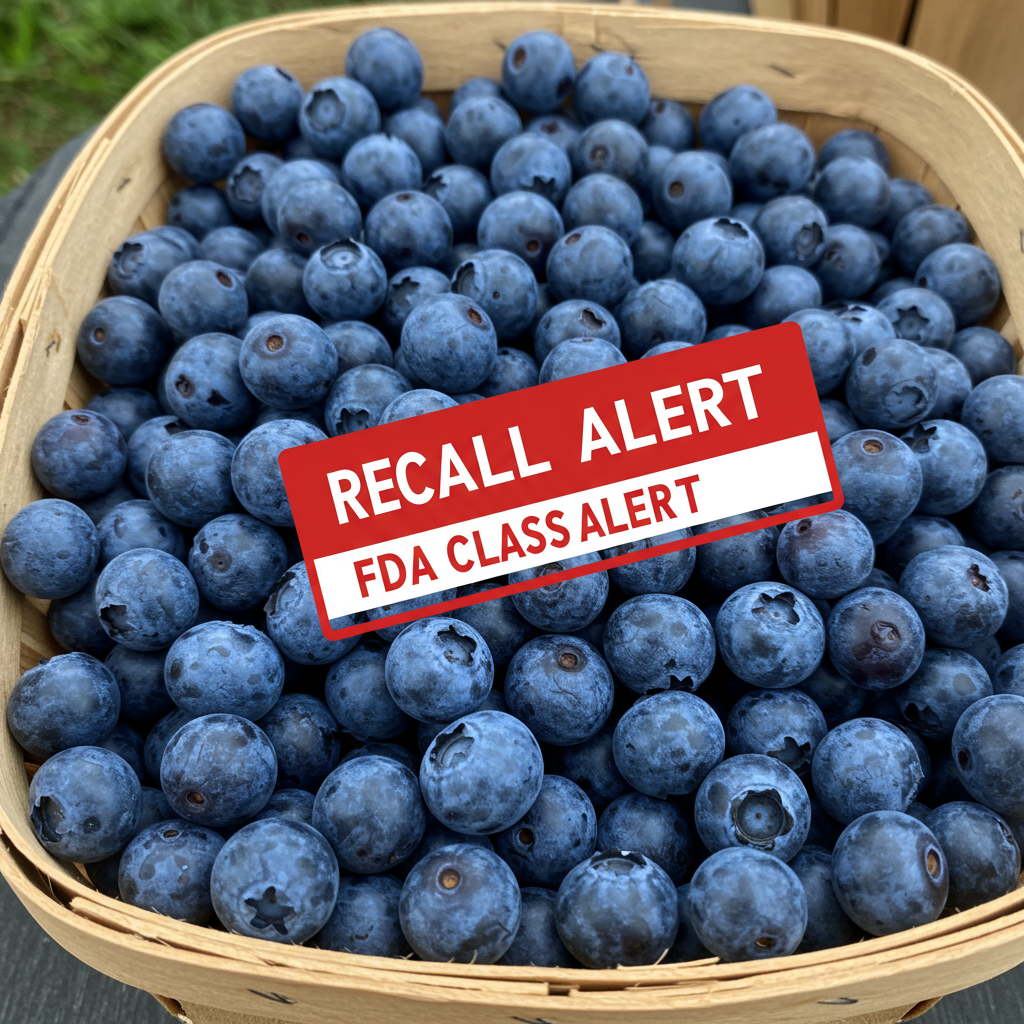A critical food safety alert has been issued regarding a voluntary recall of specific organic blueberry products. Georgia-based Alma Pak International LLC initiated the recall after routine testing detected listeria monocytogenes contamination on a finished product. The U.S. Food and Drug Administration (FDA) has classified this as a Class I recall, the most serious type, signaling a significant health risk. Consumers in North Carolina who purchased these blueberries should immediately check for affected products.
Urgent Blueberry Recall: What You Need to Know
Alma Pak International LLC is voluntarily recalling 400 boxes of its organic blueberry products. This action stems from the potential presence of Listeria monocytogenes, a dangerous bacterium. The company issued the recall on June 9. The FDA later elevated the classification to Class I on July 1. This highest-level classification underscores the potential for severe health consequences.
Each recalled box weighs 30 pounds. These large containers were shipped specifically to a customer located in North Carolina. The affected products can be identified by two distinct lot numbers: 13325 G1060 and 13325 G1096. Finding Listeria during the company’s routine testing prompted this recall. This testing is a standard food safety measure.
Why the FDA Issues Class I Recalls
Understanding the FDA’s classification system is vital. A Class I recall represents the most serious situation. The FDA defines it as a circumstance where there is a reasonable probability. This probability indicates that using or being exposed to the contaminated product could cause serious adverse health consequences. In the worst-case scenario, it could even lead to death. This classification is reserved for the most dangerous food safety issues identified. It serves as an urgent warning to consumers and the public.
The Serious Threat of Listeria Contamination
Listeria monocytogenes is an organism that can cause a severe illness called Listeriosis. While healthy individuals might experience milder, short-lived symptoms, the infection poses significant risks to certain populations. Symptoms for healthy people can include high fever, severe headache, stiffness, nausea, abdominal pain, and diarrhea. These typically resolve without long-term issues.
Who is Most Vulnerable to Listeria?
However, the danger is much greater for vulnerable groups. This includes young children, frail or elderly individuals, and people with weakened immune systems. In these populations, Listeria can cause serious and sometimes fatal infections. The bacteria can spread beyond the gut, leading to conditions like meningitis or septicemia.
Pregnant women face unique and devastating risks from Listeria infection. Even if the mother experiences only mild, flu-like symptoms, the infection can harm the fetus. Listeria infection during pregnancy can cause miscarriages, stillbirths, premature delivery, or life-threatening infections in the newborn baby. Due to these severe potential outcomes, pregnant women are strongly advised to avoid foods known to carry a higher risk of Listeria.
What Consumers Should Do Now
If you are a consumer, retailer, or distributor in North Carolina who received Alma Pak organic blueberries, you must take immediate action. First, check if you have the affected product. Look for organic blueberries from Alma Pak International LLC. Verify the lot numbers on the packaging match either 13325 G1060 or 13325 G1096. Remember, these were primarily shipped to North Carolina.
If you confirm you have the recalled product, do not consume it under any circumstances. The most crucial step is to prevent anyone from eating these blueberries. They should be safely discarded. You can double-bag them and place them in a sealed trash receptacle to prevent accidental consumption by others or pets. Alternatively, you may contact the place of purchase for instructions on returning the product for a refund.
Seeking Medical Advice
If you believe you have consumed any of the recalled blueberries and experience symptoms consistent with Listeria infection, especially if you are in a high-risk group (pregnant, elderly, young child, immunocompromised), you should seek medical attention immediately. Inform your healthcare provider about the potential exposure. Early diagnosis and treatment are critical, particularly for vulnerable individuals. Even if symptoms are mild, those in high-risk categories should consult a doctor.
Understanding Food Safety Testing
Recalls like this highlight the importance of regular testing in the food supply chain. Alma Pak International LLC discovered the potential Listeria contamination during routine testing procedures conducted by the firm. Food manufacturers are responsible for ensuring the safety of their products. Routine microbial testing is a standard practice designed to identify potential contaminants before they reach consumers. While unfortunate that contamination occurred, the recall process demonstrates the system working to identify and remove the affected product from the market. This proactive testing allowed the company to initiate a voluntary recall. The FDA’s subsequent classification reinforces the severity and necessity of this action.
Broader Implications for Food Safety
This incident serves as a reminder of the ongoing need for vigilance in food safety. Contamination can occur at various points, from farm to processing plant to distribution. Regulatory bodies like the FDA play a critical role in overseeing food safety standards and responding to potential hazards. Consumers also have a role by staying informed about recalls and following safety guidelines, like proper washing of produce, though washing alone may not remove Listeria if present.
Frequently Asked Questions
What makes Listeria contamination in food so dangerous?
Listeria monocytogenes is dangerous because it can cause severe illness, particularly in vulnerable individuals. While healthy people might only experience mild, flu-like symptoms, Listeria can cause life-threatening infections like meningitis or bloodstream infections in young children, the elderly, and those with weakened immune systems. For pregnant women, even mild symptoms can lead to devastating outcomes like miscarriage or stillbirth. The FDA classified this blueberry recall as Class I due to this high potential for serious health consequences or death.
Which specific blueberry products are included in the Alma Pak recall?
The recall specifically affects organic blueberry products from Alma Pak International LLC. The recalled items are packaged in 30-pound boxes. Consumers can identify the potentially contaminated blueberries by checking for one of two specific lot numbers: 13325 G1060 or 13325 G1096. These affected boxes were shipped to a customer located in North Carolina. It is important to verify the brand, product type, weight, lot number, and potentially the shipping destination to determine if you have the recalled product.
What steps should I take if I purchased the recalled blueberries?
If you have Alma Pak organic blueberries that match the description and lot numbers of the recalled product (13325 G1060 or 13325 G1096), you should immediately cease using them. Do not eat the blueberries. The safest action is to discard them securely, ensuring they cannot be consumed by anyone. You may also contact the retailer where you purchased them or Alma Pak International LLC directly for potential refund or return instructions. If you have consumed the product and experience symptoms of Listeriosis, particularly if you are in a high-risk group, consult a healthcare professional immediately.
Stay Informed and Stay Safe
Food recalls are issued to protect public health. This Alma Pak organic blueberry recall highlights the potential dangers of Listeria contamination, especially for sensitive populations. By checking your products against the recall details and following the recommended actions, you can help ensure your safety and the safety of your family. Always be vigilant about food safety information and respond promptly to official recall notices.




